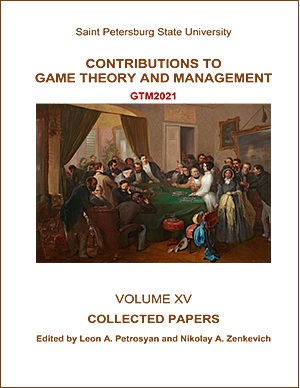Solution of the Meeting Time Choice Problem for n Persons
DOI:
https://doi.org/10.21638/11701/spbu31.2022.22Abstract
Keywords:
optimal timing, linear utility functions, sequential bargaining, Rubinstein bargaining model, subgame perfect equilibrium, stationary strategies, backward induction
Downloads
References
Downloads
Published
How to Cite
Issue
Section
License
Articles of "Contributions to Game Theory and Management" are open access distributed under the terms of the License Agreement with Saint Petersburg State University, which permits to the authors unrestricted distribution and self-archiving free of charge.




